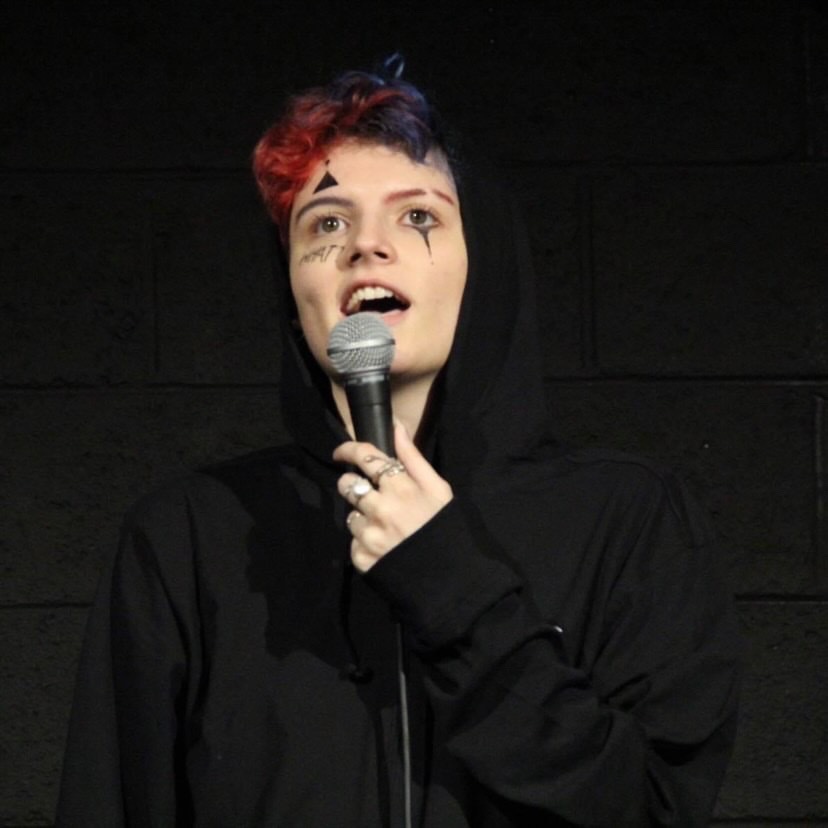By Maliha Shoaib, BA English and World Philosophies
A year into the Covid-19 pandemic, it’s clear that the entertainment industry and the arts have taken a real hit. No more cinemas, no more exhibitions, no more premiers, no more gigs. While many have managed to adapt to our new remote lifestyles using online platforms, those that thrive off of the energy of a live audience have been impacted the most. In particular, live comedy shows are a thing of the past. Aside from interpreting the audience’s personal engagement to develop parts of their set, many comedians also find the silence and delayed reactions of a Zoom set alienating.
We spoke to two young comedians about their experiences with remote comedy and how – or if – the comedy scene has managed to adapt.
22-year-old newcomer Henry Whaley (@WhaleyHenry on Twitter) was just getting started with stand up comedy when the pandemic kicked off. ‘When lockdown hit and people set up Zoom nights I couldn’t see how it would work.’ Henry stressed that there’s an element of connection that is lost online. ‘When you’re on stage, you have control of the whole room for that time – you can play with the relationship with the audience, and with the particularities of the space. On Zoom, all of that control is taken away and you are sitting in your room talking to yourself, not knowing if they are laughing at you or your internet connection.’
Detroit-based, 21-year-old comedian Diana Graham had similar views about Zoom comedy shows. ‘I miss the impermanence of live comedy. I can’t try a joke 6 times before getting it right, virtually. With zoom shows you get a delayed reaction if any, and that’s hard to build off of.’ They added, ‘I can’t tell a super personal story without worrying about anyone I know hearing it. Not only have you lost the energy and confirmation of a crowd, you’ve lost the allowance of time and attention to get them on your side and laughing with you.’
Diana, who has been doing comedy for about two years now, doesn’t think they’re cut out for Zoom comedy. ‘I think joke telling to a screen requires a completely different skill set, and I’m not sure that I have it,’ they said. ‘There’s a reason popular comedy YouTubers/content creators aren’t good stand ups, and vice versa.’
After gaining over 150,000 followers on TikTok (@dianaggraham), Diana has had to deal with a number of hate comments. ‘In person, nobody comes up to you to tell you to your face that they simply didn’t laugh at one particular joke of yours. On the Internet, they can play it over and over again and pick it apart until they hate you,’ they added.
While lockdown has clearly had detrimental effects on most stand up comedians, Henry explained that there have been a number of comedians who are committed to putting on Zoom gigs, particularly for newcomers. While he’s decided to stick it out until the pandemic is over, he highlighted a few of his favourite comedians who have managed to adapt.
‘Tim Key hosted a live show where he wandered around his flat, made a Yorkshire pudding, read some poems, and got in the bath. It was shambolic but it felt like something that could only be achieved in response to the moment. Joz Norris turned his cancelled live show into a film, all set in his flat, which worked really well and probably gained a lot through the visual emphasis he was able to put on it through editing. John Luke-Roberts recorded an album on vinyl as part of a Crowdfunder campaign, harking back to classic comedy records which didn’t have an audience.’
He thinks the reason these gigs have been successful was because ‘they accepted and uniquely responded to the loss of a live audience and didn’t try to compromise.’
Right now we’re all nostalgic about the humanness of laughter and connection, but it’s encouraging to see a number of comedians adapting to the times. Perhaps stand-up as we know it isn’t possible through the screen – for that we’ll have to wait another few months. Until then, we’ll continue to miss the sticky floors, that one person in the back with a weird laugh, and dodging the front row.
Photo caption: Diana Graham is known as ‘the little sister of Detroit comedy.’ (Credit: Diana Graham)
